

Selvudvikling. Notesbog. Forum. Autofocus. Filing. Udvikling. Lifehack 2. Mind Tools - Self-Study Management Training, Career Training, Le. D*I*Y Planner Hipster PDA Edition. Welcome to the D*I*Y Planner Hipster PDA Edition 3.0, a series of approximately one hundred free productivity forms designed for printing onto index cards (a.k.a., the Hipster PDA). Designed especially for the D*I*Y Planner project by Douglas Johnston, the package includes a wide array of cards covering life management, project planning, calendars, notetaking, business development, and creative uses like writing, storyboards, mind mapping, and photography. These are a subset of our regular D*I*Y Planner forms, completely re-designed for the smaller size, and may be used in conjunction with a full-sized planner, alongside a notebook like a Moleskine, or as a stand-alone system.
Although chiefly inspired by David Allen's Getting Things Done, an emphasis has been placed upon tweakability, multiple methodologies, and tinkering (endlessly!) With ideas. The package includes: Find this kit useful? 1-Up Version (3.0 Mb) This PDF package is for printing directly onto index cards. (Remember to. Your Key 20 Percent. One concept that I try to incorporate into my life on a continual basis is the 80/20 rule.
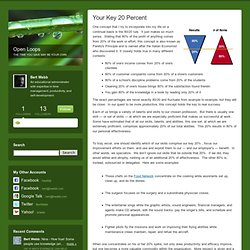
It just makes so much sense. Stating that 80% of the profit of anything comes from 20% of the work or effort, this concept is also known as Pareto's Principle and is named after the Italian Economist who discovered it. It closely holds true in many different contexts: 80% of one's income comes from 20% of one's clientele 80% of customer complaints come from 20% of a store's customers 80% of a school's discipline problems come from 20% of the students Cleaning 20% of one's house brings 80% of the satisfaction found therein You gain 80% of the knowledge in a book by reading only 20% of it.
Setting Up Outlook for GTD. Averyr File Sorter Black by Viking Direct. Three-Pocket File Folder Organizer: Office Products. Are You Effective or Just Busy? Cal. November 8th, 2007 · 20 comments The Difference Between Effective and Busy A few months back, I published an essay titled: Productivity is Overrated.
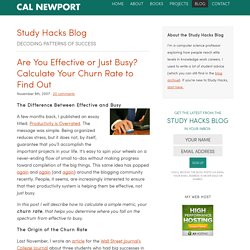
The message was simple. Being organized reduces stress, but it does not, by itself, guarantee that you’ll accomplish the important projects in your life. It’s easy to spin your wheels on a never-ending flow of small to-dos without making progress toward completion of the big things. In this post I will describe how to calculate a simple metric, your churn rate, that helps you determine where you fall on the spectrum from effective to busy.
The Origin of the Churn Rate Last November, I wrote an article for the Wall Street Journal’s College Journal about three students who had big successes in their first years after college. Bartek:bargiel : iGTD. How To: Fix Leaks In Your GTD System. Daily Priority Planner. 18 Ways to Stay Focused at Work. Over the years I have worked at many client sites and a variety of office layouts.
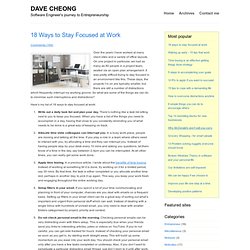
On one project in particular, we had as many as 80 people in a project team, seated via an open plan arrangement. It was pretty difficult trying to stay focused in an environment like this. To-Done. Tanker om selvledelse. Overwhelming Force. When you want to make a change in your life, especially a big one, you’ll typically meet resistance along the way.
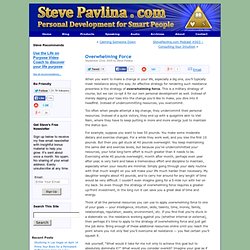
An effective strategy for rendering such resistance powerless is the strategy of overwhelming force. This is a military strategy of course, but we can co-opt it for our own personal development as well. Instead of merely dipping your toes into the change you’d like to make, you dive into it headfirst. Instead of undercommitting resources, you overcommit. Too often when people attempt a big change, they undercommit their personal resources. For example, suppose you want to lose 50 pounds. 10 Ways to Optimize Your Normal Days. Many years ago an old friend and I were discussing the meaning of life.
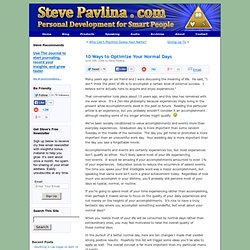
He said, “I don’t think the point of life is to accomplish a certain level of external success. I believe we’re actually here to acquire and enjoy experiences.” That conversation took place about 15 years ago, and this idea has remained with me ever since. It’s a Zen-like philosophy because experiences imply living in the present while accomplishments dwell in the past or future. Reading this particular article is an experience, but you probably wouldn’t consider it an accomplishment… although reading some of my longer articles might qualify. We’ve been socially conditioned to value accomplishments and events more than everyday experiences. Accomplishments and events are certainly experiences too, but most experiences don’t qualify as either. When you realize most of your life will be consumed by normal days rather than extraordinary ones, you may feel motivated to raise the overall quality of these normal days. 1. Hipster PDA. From 43FoldersWiki Hipster Stage 1 Hipster Stage 2.
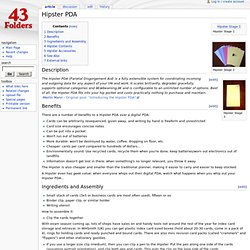
Overcoming Procrastination - Wikibooks, collection of open-conte. Getting Things Done : The Art of Stress-Free Productivity. Getting Things Done. Sometimes the sheer weight of the "In" basket -- whether it is one with paper in it or electronic messages -- is enough to keep us from starting anything.
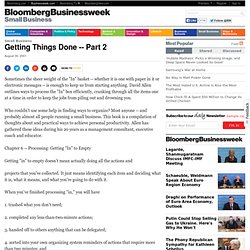
David Allen outlines ways to process the "In" box efficiently, cranking through all the items one at a time in order to keep the jobs from piling out and drowning you. Who couldn't use some help in finding ways to organize? Most anyone -- and probably almost all people running a small business. Getting Things Done. Who couldn't use some help in finding ways to have more energy, be more relaxed and get a lot more accomplished with much less effort?
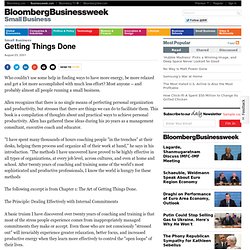
Most anyone -- and probably almost all people running a small business. Allen recognizes that there is no single means of perfecting personal organization and productivity, but stresses that there are things we can do to facilitate them. Getting started with “Getting Things Done” This article was originally posted during the first week of 43 Folders' existence, and, pound for pound, it remains our most popular page on the site.
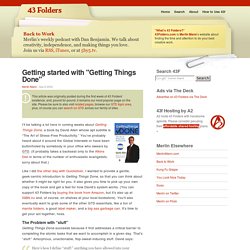
Please be sure to also visit related pages, browse our GTD topic area, plus, of course you can search on GTD across our family of sites. I’ll be talking a lot here in coming weeks about Getting Things Done, a book by David Allen whose apt subtitle is “The Art of Stress-Free Productivity.” You’ve probably heard about it around the Global Interweb or have been buttonholed by somebody in your office who swears by GTD. (It probably takes a backseat only to the Atkins Diet in terms of the number of enthusiastic evangelists: sorry about that.) Like I did the other day with Quicksilver, I wanted to provide a gentle, geek-centric introduction to Getting Things Done, so that you can think about whether it might be right for you.
The Problem with “stuff” Stuff is bouncing around in our heads and causing untold stress and anxiety. Mac tips. 43 Folders Board - Powered by vBulletin. How I Work: Bill Gates - Apr. 7, 2006. Not much of a paper chase for Microsoft's chairman, who uses a range of digital tools to do business.
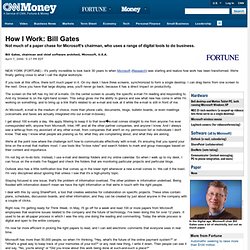
Bill Gates, chairman and chief software architect, Microsoft, U.S.A. NEW YORK (FORTUNE) - It's pretty incredible to look back 30 years to when Microsoft (Research) was starting and realize how work has been transformed. We're finally getting close to what I call the digital workstyle. If you look at this office, there isn't much paper in it. On my desk I have three screens, synchronized to form a single desktop.
The screen on the left has my list of e-mails.